
Reviewed by: Doug Webb
Updated: September 27, 2022
Not sure how to get rid of roaches? You're not alone. Cockroaches are one of the most common household pests in the world.
They're also one of the most resilient insects on the planet and can colonize just about anywhere.
To make matters worse, roaches are known to carry disease-causing pathogens that can result in food poisoning and diarrhea, as well as trigger asthma, allergies and skin rashes. In large numbers, cockroaches can also produce a foul odor. All the more reason to remove these creatures from your home before you have a full-blown infestation on your hands.
Before deciding how to kill roaches in your home, it's best to develop a plan. A licensed, professional cockroach control company can help and will collaborate with you to formulate a plan to do so. The most effective roach control typically requires more than one type of treatment method, and leans on the aid of trained professionals who are adept at identifying roaches and the most efficient solutions for your problem.
But first, understanding the basics of roaches will make it easier to help get rid of them. We'll cover both DIY methods, as well as the benefits of looking to a pest professional to get your cockroach problem under control.
Here's what to expect as you read on:
Understanding the type of roach in my home
Understanding the basics of roaches can make it easier to protect your home from these six-legged invaders. So, let's start with some roach information 101.
On average, roaches can range anywhere from one-half to 3 inches long. The most common cockroaches in the United States are:
German cockroach
German cockroaches are tan or brown in color and between one-half and one inch long. They prefer humid places with easy access to food sources and water, such as kitchens and bathrooms.
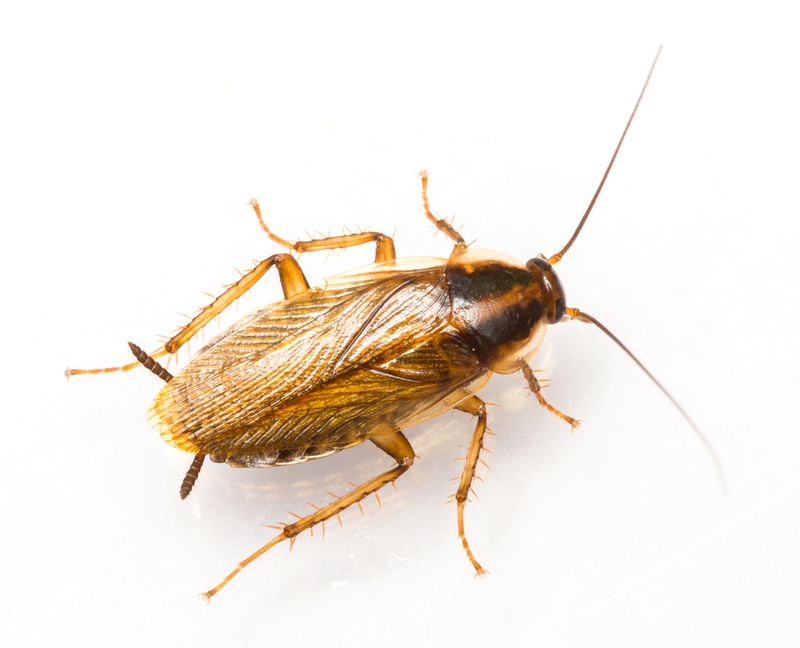
Oriental cockroach
Oriental cockroaches are around one inch long. Their black color has earned them the nickname “black beetle cockroaches." The Oriental cockroach is known to be the worst smelling of cockroaches, due in part to the chemicals they secrete in order to communicate with each other.
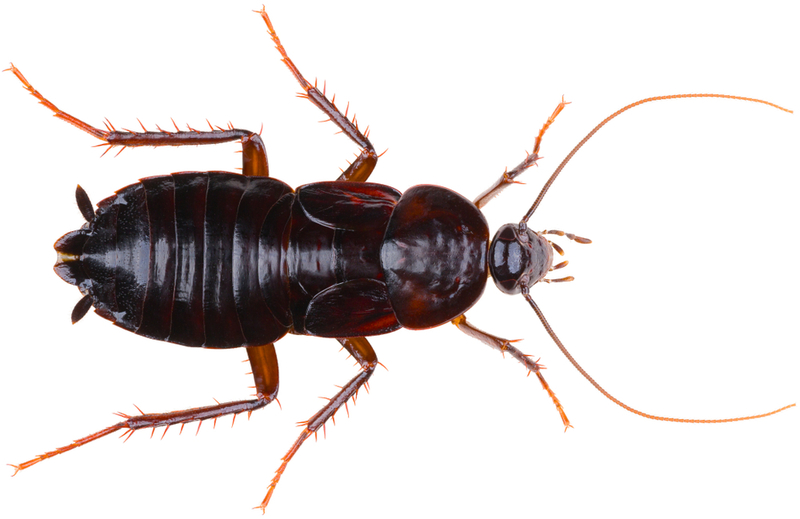
American cockroach
American cockroaches are reddish brown and between 1¼'' and 2'' long. These large roaches have been known to carry pathogens that cause a variety of diseases, including cholera, leprosy, typhoid fever and even plague.
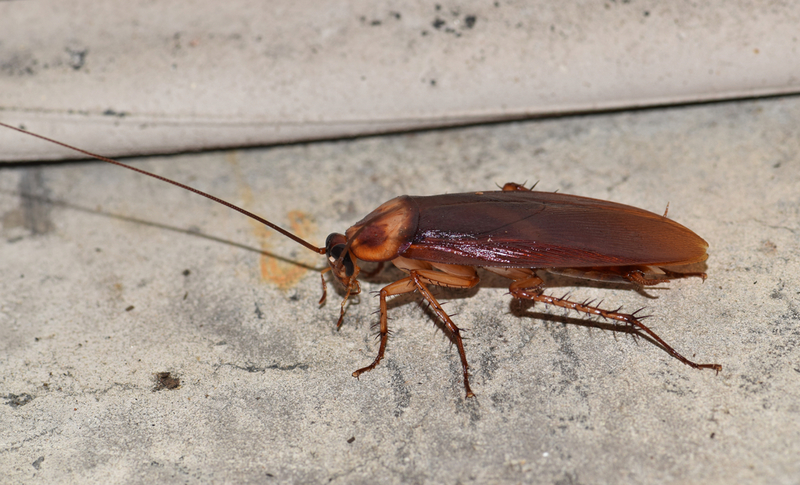
Brown-banded cockroach
The brown-banded cockroach gets its name from its light brown coloring, as well as two easily-identifiable brown bands around their wings and abdomen. They are voracious eaters and will snack on nearly anything – ranging from wallpaper paste and glue, bodily fluids, skin cells and clothing items that may carry shed dead skin cells. These pests have been known to carry roughly 33 different kinds of bacteria that may cause food poisoning or agitate asthma symptoms.
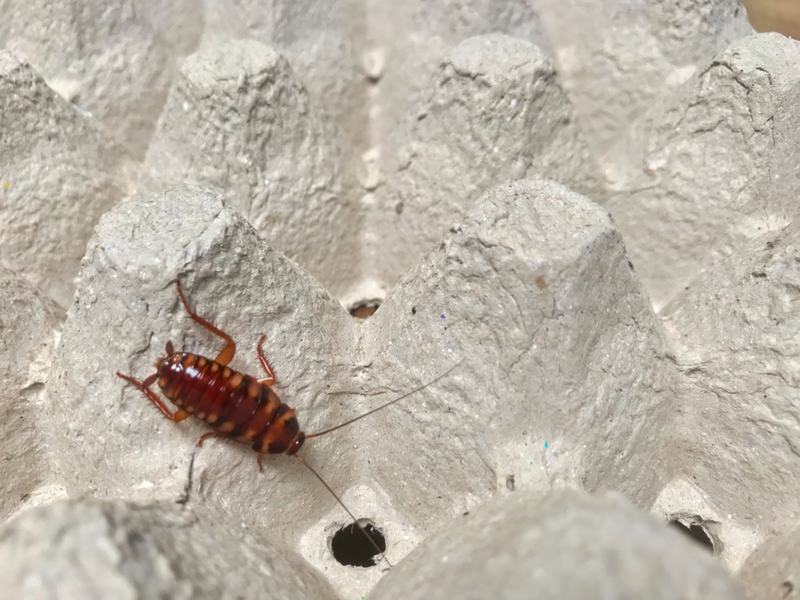
Knowing the type of roach you are dealing with can help when deciding how to get rid of cockroaches. For instance, the most common roach found indoors is the German cockroach. Like other roaches, the German cockroach needs a steady supply of food and water to survive.
What attracts roaches to my home?
Different roaches can be attracted to your home for different reasons. Many people are surprised that cockroaches take up residence in their clean homes. In reality, your house doesn't have to be dirty to attract these pests. There are many things you can do to prevent cockroaches from getting in your home, but sometimes they still find a way in, regardless of your best efforts.
Roaches enter homes in search of food, water and shelter. Once roaches have infested areas such as cupboards, sinks, kitchens, bathrooms and hard-to-reach places, they can multiply quickly, potentially posing a threat to your comfort and health. Reducing access to food and water sources in your home help make your home far less attractive to cockroaches.
Delving a little deeper, cockroaches may be drawn to your home for a variety of reasons:
Location
While roaches thrive all over the United States, some areas are more preferable due to their humid climates and abundance of moisture. For example, American cockroaches mostly live in the southeastern part of the U.S., though they can survive and be found in many other parts of the country. However, many roaches are location-agnostic and can enter a house simply because it's in their path. Once they enter your home and find a steady source of food and water, cockroaches may decide to stay.
Food and water sources
Your home contains many sources of food for cockroaches. You don't even have to leave food out in the open. In addition to feeding on what you might have in your pantry, these pests can chew on wallpaper, cardboard, leather, and soap. Additionally, cockroaches are drawn to moisture, which can be caused by leaky faucets and other open water sources.
Refuse of all kinds is an open invitation to cockroaches. If you have standing water, compost, woodpiles, and trash bins near your home, it may serve as a homing beacon for hungry and thirsty cockroaches.
Dirty dishes in the sink
Leaving dirty dishes in the sink (even for a short while) can attract roaches. A sink that provides both water and food is an excellent reason for cockroaches to settle in your kitchen.
Crumbs on the floor or counters
When you leave food out in the open, a stray cockroach that simply runs through your home on its way to another place could decide to stay.
Garbage
If not properly bagged, stored in a tightly-closed receptacle or disposed of, cockroaches can feed on your garbage during the night. Make sure to remove garbage regularly.
Open pet food or food on the floor
When you feed your pets, make sure to remove any leftover food to avoid granting roaches easy access to a food source.
Shelter
Some roaches enter homes when searching for shelter. When temperatures outside decrease, these pests look for a warm and humid place with plenty of food, making your home an ideal choice.
Landscaping
Your yard can also provide an appealing water and food source for cockroaches. Remove standing water and food sources to make your home and yard less attractive to roaches.
Neighbors
Even if you are doing everything right, cockroaches could come over from your neighbors' property — especially if you share an adjoining wall, such as in an apartment complex, condo or row home.
That's why professional pest control is always your best bet for getting rid of cockroaches.
How roaches enter your home
Roaches are small so they can enter your home in a variety of ways. Blocking some of the most common entry points can help prevent an infestation.
Cracks and gaps in windows and doors
If you have any cracks or gaps around your windows and doors, roaches can easily squeeze through. Make sure to caulk all cracks and gaps or replace old, drafty windows to block these entry points.
Holes in vents and pipes
Holes in your vents and pipes can make it easy for roaches to enter your home. If your pipes and vents are old, consider looking into getting them replaced. Make sure to inspect them regularly to catch cracks before they turn into holes.
Furniture and other items
In freestanding homes, German cockroaches may hitch a ride on items that are brought into the home such as groceries, new clothing, furniture, and suitcases.
Cockroach prevention tips
As the saying goes, "an ounce of prevention is worth a pound of cure." One of the best ways to help get rid of roaches is to mount a strong defense in terms of good sanitation practices, such as daily cleaning and proper food storage. Staying mindful of these small-yet-important tasks can lessen your chances of a cockroach infestation.
Simple cleaning and maintaining a vigilant eye can help reduce the chances of a cockroach infestation, but cannot assure that cockroaches will not infest. In the event your roaches are too much to manage on your own, contact a pest control professional.
But how do you get rid of cockroaches for good once they've already entered your home?
Here are some tips to follow to help prevent roaches:
Clean to remove things that cockroaches need
Like most living creatures, cockroaches need food and water to survive. By practicing regular sanitation in your home, you can make your home less inviting to roaches.
- Remove trash regularly
- Use trash liners and be sure trash can lids are tightly shut
- Clean grease and food debris daily after using your kitchen
- Sweep away crumbs from floors and countertops
- Wash and put away dirty dishes
- Vacuum and mop regularly
- Dispose of uneaten pet food or cover your pet's dishes after they feed
Clean kitchen appliances regularly for cockroach reduction
Food particles and crumbs tend to stay in kitchen appliances such as toasters, steamers and coffeemakers. To prevent cockroaches from finding a source of sustenance in your kitchen, clean these appliances regularly. Consider the following tips:
- Empty your toaster pan of crumbs regularly
- Wash out any blenders or food processors and place lids back on tightly
- Empty out coffee filters and dispose of them in the trash (or compost them)
Get rid of standing water to help minimize roach attraction
Cockroaches can live for weeks without food but must have a nearby water source to survive long-term. Getting rid of water sources can help make your home less appealing to roaches. Remove standing water around your home by fixing any leaky faucets and wiping surfaces dry after taking a shower.
Use caulk to close gaps and entry points to help prevent further roach infestation
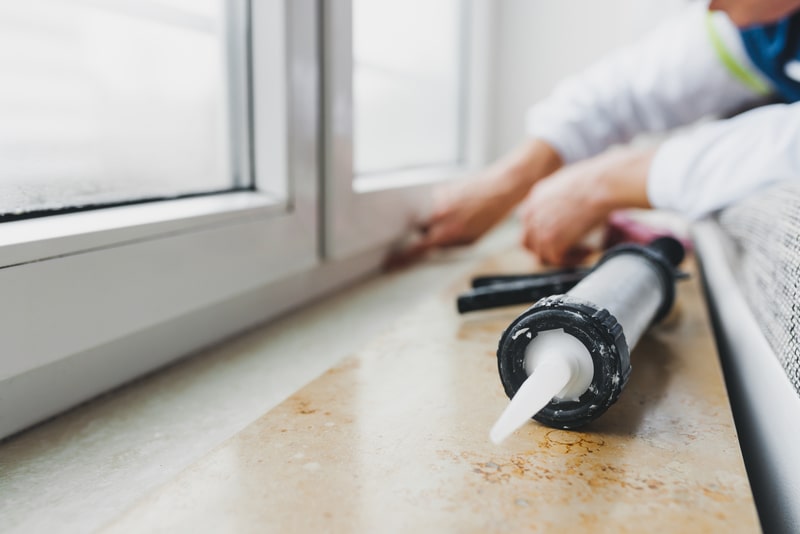
Roaches seek shelter in your home, looking for food and water. Because of their small size, roaches can get into your house through a crack as small as a hairpin or a paper clip.
To prevent roaches from getting in, use caulk or another sealant to fill possible entry points, including gaps between walls or tile, small crevices, and openings around faucets or utility penetrations. These cracks can also be sealed with weather stripping on doors and window sills.
How to get rid of roaches naturally
As a homeowner, you might be tempted to look into how to get rid of roaches naturally as both a convenient method of pest control and because many people believe natural methods may not harm children and pets, or cause allergies. The internet is full of DIY "solutions" for insect problems, but most are unproven and may even be dangerous. The truth is, you should still use natural remedies with caution and that these methods may not always be effectively applied in order to quell a roach infestation.
Borax and boric acid for roach treatment
Boric acid and borax are both compounds made from the element boron. They are similar, but are slightly different in their formulation of boron. Borax is a mineral salt, while boric acid undergoes more processing and can be dissolved in water.
When a roach ingests boric acid, it attacks the pest's nervous system and kills it. Additionally, it eats away at the stomach lining of these pests, making it impossible for them to process food. However, in order for boric acid to work, it must be placed in strategic areas where roaches travel.
That said, how long does it take for boric acid to kill roaches? It takes around 72 hours for this natural remedy to work. However, boric acid only kills adult roaches, but doesn't harm their eggs.
At best, both boric acid and borax can kill adult roaches, but leave you with dead roach carcasses littering your home. At worst, these compounds can be toxic to children and pets if ingested. Additionally, boric acid and/or borax will not harm cockroach eggs. When these eggs hatch, you're back at square one, treating a fresh infestation of cockroaches.
Baking soda for roach treatment
When a roach ingests baking soda and then drinks water, the baking soda expands and kills them. When using baking soda, you would need to mix it with sugar to make sure roaches eat it. Unfortunately, similar to boric acid, baking soda offers limited results.
Citrus as a roach treatment option
Cockroaches have an aversion to the smell of citrus. That's why cleaning your home with citrus-containing solutions can keep roaches from roaming around certain surfaces. Unfortunately, the scent evaporates quickly and will not be a long-term solution to keeping roaches at bay.
Diatomaceous Earth to solve roach problems
Diatomaceous Earth (DE) kills roaches by damaging their exoskeletons. In order for this treatment to work, you would need to place DE everywhere roaches walk, live, and feed. While useful in killing adult roaches and nymphs, DE doesn't do much for their eggs.
Essential oils to get rid of roaches
Essential oils can repel cockroaches. These pests don't like cedar, eucalyptus, lavender, and catnip. The downside of using essential oils is the possibility of allergic reactions. Meanwhile, the effect of these repellents is usually short-lived and will not serve as a long-term deterrent to cockroaches.
How to get rid of roaches with conventional methods
Natural methods and home remedies don't always work, allowing the cockroach population to increase. In some instances, they can be potentially hazardous. That's why some homeowners prefer using more conventional treatment methods for tackling a roach problem.
Identify problem areas with flashlight and glue traps
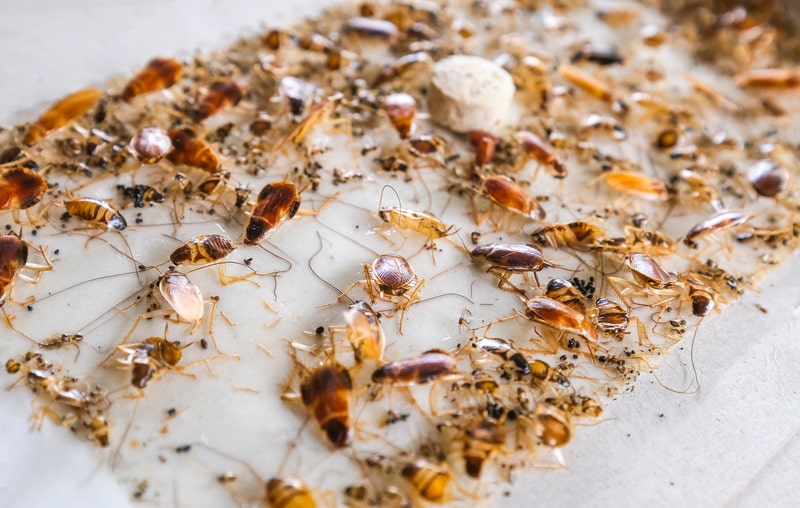
When considering what cockroach control method to use, examine your home for possible heavy roach infestation sites. Use a flashlight to search popular roach hiding spots, including behind the refrigerator, under the sink, crevices in cabinets and shelves, closet door corners, bathroom cabinets, and closets.
Use roach glue traps for large infestations. Based on your flashlight inspection, decide on the most strategic areas to place glue traps or monitors. Monitor those areas for a few days to a week. With most cockroaches, traps or monitors can indicate a high-traffic area.
The main downside of glue traps is that some cockroaches are bound to avoid them. That's why, if you're looking for the best way to tame your roach problem, you should contact a licensed pest management professional. A Terminix professional is trained in integrated pest management, which combines a variety of treatment methods to effectively treat infestations.
Roach bombs or foggers to get rid of cockroaches
Using bug bombs or "foggers" to get rid of cockroaches is not advised. Improper use of these foggers can trigger breathing problems, nausea, or asthma attacks. Worse yet, using multiple foggers can potentially cause an explosion or cause a house fire if pilot lights or other ignition sources are not properly extinguished.
Be wary of home remedies to get rid of roaches
When facing a roach infestation in your home, you may be tempted to take matters into your own hands. Although there are many natural and DIY methods products touted as cockroach solutions, they are often ineffective — and some are potentially dangerous.
Even "natural" methods should be used with caution, especially in homes with pets and children. Though these treatment methods are natural, they may involve chemical applications, which are best left to the professionals.
The benefits of such DIY treatment methods as borax, boric acid, essential oils, baking soda and diatomaceous earth (DE) are unproven. Even though these methods are "natural," that does not necessarily mean they can't pose a danger to your household if used incorrectly.
How can I get rid of roaches permanently at home?
While there are an impressive variety of DIY roach extermination methods, most are only partially effective. Cockroaches are highly resilient pests. They adapt to many natural and conventional repellants and treatments. Getting rid of these insects permanently requires a comprehensive, professional approach.
Call a licensed professional when home remedy methods don't work
As with most DIY methods, application can be tricky and unpredictable, and likely won't stamp out a roach infestation. Instead, consult a professional cockroach control expert who can assess your situation and has the training needed to apply an effective solution.
Many DIY methods aim at killing adult roaches but do very little to deal with their eggs. Since some roaches can lay up to 50 eggs per month, you might have hundreds or thousands of eggs just waiting to hatch and leave you with a fresh infestation. A qualified pest control specialist can not only provide you with a solution to help get rid of adult roaches, but is also able to offer a plan to help remove their eggs, as well.
How do pest control experts get rid of heavy roach infestations?
To help control a cockroach infestation, pest control experts take several steps. For instance, they:
- Inspect your home to find cockroach nests
- Evaluate the extent of the infestation
- Consider the needs of your particular household (if you have any pets or children)
- Design a personalized cockroach treatment plan
- Decide which treatment combination will work best for your situation
- Implement the plan according to a customized schedule
- Offer cockroach prevention advice and schedule regular inspections
Hiring a Terminix specialist to treat a roach infestation gives you peace of mind, offers a proven and effective approach to getting rid of cockroaches and provides an ongoing solution to cockroach control.
When you choose Terminix, you gain access to a personalized cockroach extermination plan that can help you tackle your cockroach problem.
Cockroach removal resources:
- How to Get Rid of Cockroaches in Your Apartment
- Baby Roaches in Kitchen or Bathroom
- Roach Traps and Bait: Do They Really Work?



